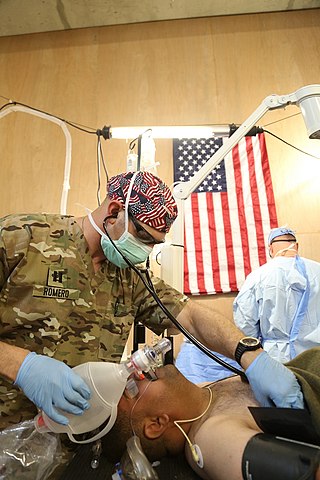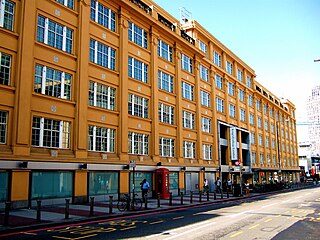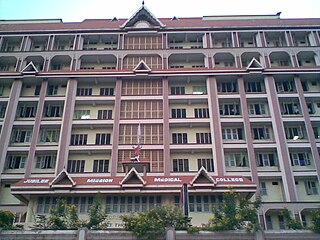Related Research Articles

A registered nurse (RN) is a nurse who has graduated or successfully passed a nursing program from a recognized nursing school and met the requirements outlined by a country, state, province or similar government-authorized licensing body to obtain a nursing license. An RN's scope of practice is determined by legislation, and is regulated by a professional body or council.

A nurse anesthetist is an advanced practice nurse who administers anesthesia for surgery or other medical procedures. They are involved in the administration of anesthesia in a majority of countries, with varying levels of autonomy.

Nurse education consists of the theoretical and practical training provided to nurses with the purpose to prepare them for their duties as nursing care professionals. This education is provided to student nurses by experienced nurses and other medical professionals who have qualified or experienced for educational tasks, traditionally in a type of professional school known as a nursing school. Most countries offer nurse education courses that can be relevant to general nursing or to specialized areas including mental health nursing, pediatric nursing and post-operatory nursing. Courses leading to autonomous registration as a nurse typically last four years. Nurse education also provides post-qualification courses in specialist subjects within nursing.

The Florence Nightingale Faculty of Nursing, Midwifery & Palliative Care is an academic faculty within King's College London. The faculty is the world's first nursing school to be continuously connected to a fully serving hospital and medical school. Established on 9 July 1860 by Florence Nightingale, the founder of modern nursing, it was a model for many similar training schools through the UK, Commonwealth and other countries for the latter half of the 19th century. It is primarily concerned with the education of people to become nurses and midwives. It also carries out nursing research, continuing professional development and postgraduate programmes. The Faculty forms part of the Waterloo campus on the South Bank of the River Thames and is now one of the largest faculties in the university.

Panchkula(Haryanvi pronunciation) is a planned city and district headquarter in the Panchkula district in Haryana, India. Panchkula is a border city with Punjab, majority of the population belongs to Haryanvi community. The origin of the name Panchkula came from the place where five irrigation canals meet. At present, it forms a part of an adjoining area to Chandigarh, Mohali, and Zirakpur. It is approximately 4 km (2.5 mi) southeast of Chandigarh, 105 km (65 mi) southwest of Shimla, 44 km (27 mi) from Ambala and 259 km (161 mi) northeast of New Delhi, the national capital. It is a part of the Chandigarh capital region or Greater Chandigarh. The Chandigarh-Mohali-Panchkula metropolitan region collectively forms a Chandigarh Tricity, with a combined population of over two million.

The Government Medical College, Thiruvananthapuram is in Thiruvananthapuram, India. Founded in 1951, it was inaugurated by Prime Minister Jawaharlal Nehru and is Kerala's first ever Medical College.
The word "nurse" originally came from the Latin word "nutrire", meaning to suckle, referring to a wet-nurse; only in the late 16th century did it attain its modern meaning of a person who cares for the infirm.

Nursing is a profession within the healthcare sector focused on the care of individuals, families, and communities so they may attain, maintain, or recover optimal health and quality of life. Nurses can be differentiated from other healthcare providers by their approach to patient care, training, and scope of practice. Nurses practice in many specialties with differing levels of prescription authority. Nurses comprise the largest component of most healthcare environments; but there is evidence of international shortages of qualified nurses. Nurses collaborate with other healthcare providers such as physicians, nurse practitioners, physical therapists, and psychologists. There is a distinction between nurses and nurse practitioners; in the U.S., the latter are nurses with a graduate degree in advanced practice nursing, and are permitted to prescribe medications unlike the former. They practice independently in a variety of settings in more than half of the United States. Since the postwar period, nurse education has undergone a process of diversification towards advanced and specialized credentials, and many of the traditional regulations and provider roles are changing.
Nursing is a major component of Pakistan's health-care system. The topic has been the subject of extensive historical studies, is as of 2009 a major issue in the country, and has been the subject of much scholarly discussion amongst academics and practitioners. In 2009, Pakistan’s government stated its intent to improve the country's nursing care.

Jubilee Mission Medical College and Research Institute is a private, non-profit Christian minority medical college, hospital and research institute located at Thrissur in Kerala, India. The establishment is administered by the Jubilee Mission Hospital Trust, a charitable organisation under the Catholic Archdiocese of Thrissur.
Nursing in India is the practice of providing care for patients, families, and communities in that nation to improve health and quality of life.

The Seventh-day Adventist Hospital, Ottapalam is a charitable mission hospital in Ottapalam in the Palakkad district of Kerala, India. It was established in 1969 as a part of a health care unit of the worldwide organisation - the Seventh-day Adventist Church. The hospital lies adjacent to the Palakkad - Shoranur highway.

Amrita Hospital, formerly known as Amrita Institute of Medical Sciences (AIMS) is a tertiary care centre based in Kochi, India attached to Amrita University school of medicine. It is one of the largest medical facilities in the country with a total built-up area of over 3.33 million sq.ft, spread over 125 acres of land. It is a 1,350-bed hospital which supports an annual patient volume of about 800,000 outpatients and 50,000 inpatients. It was inspired by Mata Amritanandamayi and inaugurated on 17 May 1998 by the then Prime Minister, Atal Bihari Vajpayee. The Mata Amritanandamayi Math is its parent organisation. The medical school is a part of the Health Sciences campus of Amrita Vishwa Vidyapeetham.
The history of nursing in the United Kingdom relates to the development of the profession since the 1850s. The history of nursing itself dates back to ancient history, when the sick were cared for in temples and places of worship. In the early Christian era, nursing in the United Kingdom was undertaken by certain women in the Christian Church, their services being extended to patients in their homes. These women had no real training by today's standards, but experience taught them valuable skills, especially in the use of herbs and folk drugs, and some gained fame as the physicians of their era. Remnants of the religious nature of nurses remains in Britain today, especially with the retention of the job title "Sister" for a senior female nurse.

The history of nursing in the United States focuses on the professionalization of nursing since the Civil War.
Philadelphia Hospital is a hospital in Ambala, Haryana, India.

St Stephen's Hospital Delhi is one of the oldest and the largest private hospitals in New Delhi, India. The hospital today has 600 beds and is presently a superspeciality tertiary care hospital offering comprehensive care covering all major clinical specialities and most super-specialities. The institution started as a dispensary in 1876 by the Delhi Female Medical Mission, on the banks of river Yamuna. The hospital was later established in 1885 as a small facility with 50 beds in Chandni Chowk and opened by Lady Dufferin, Vicereine of India. It was the first hospital for women and children.
References
- ↑ Jaggi, O. P. (2000). Medicine in India: Modern Period. Oxford University Press. p. 62. ISBN 9780195651263.